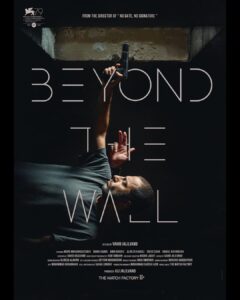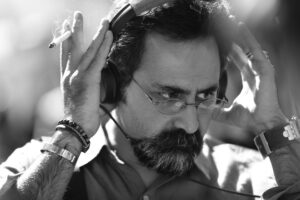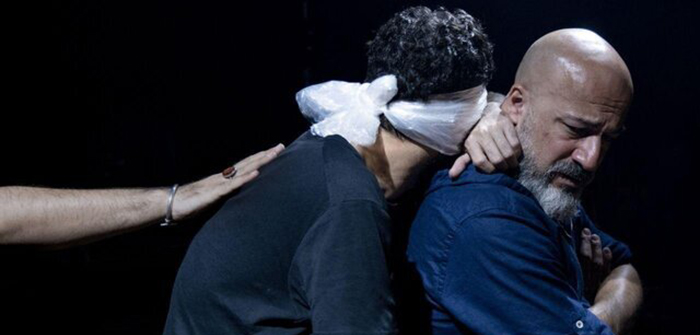In my home country of Iran, social justice films never receive the required governmental production permits or–if they’re made–they never see the light of the silver screen. Those films eventually end up on social media platforms illegally with no financial benefits for the producer and the director. That’s what happened to the Leila’s Brothers and this movie, Beyond the Wall. Like other movies made by Vahid Jalilvand, the film begins by portraying the suffering of lower-class families living in poverty. From the very start, this film grabs you, engages you and doesn’t let you go. The main character of the film, Ali, is a blind man who–during the arresting of protesters in last year’s Iran’s uprising–mixes with them, follows and supports them. Viewers may not grasp what is happening underneath the skin of this story until the very end. The intercuts between flashback and present-day sequences are very creative and understandable for the audiences. Most of the film takes place in an imaginary apartment where Ali lives. Only in the very last sequence of the film do we find out the truth about this apartment.
The atmosphere of the film is very dark and bleak. It’s this darkness that keeps you curious until the very last shot of the film. The main locations of the film are the apartment and of the streets of Tehran, where protesters are gathering. Quite a familiar scene for those who have been witnessing these protests in the last 2 years.
Without a doubt, Navid Mohammadzadeh’s portrayal of Ali in Beyond the Wall is way ahead of other actors in Iranian Cinema when it comes to strength of performance. I watched a few of Navid and the Director’s captivating rehearsals for this movie on social media and they provided proof of the hard work of the actor and the director in making the life of a lonely blind man in the film believable
In every sequence of the Beyond the Wall, your understanding of the film is challenged by what happens next. This challenge follows you to the end of the film.
Good news is that audience around our planet will be able to to watch Beyond the Wall in theaters and streaming platformsas Match Factory has aquiered the screening right to this beautuful and powerful film.
 CAST:
CAST:
Navid Mohammadzadeh – Ali
Diana Habibi – Leila
Amir Aghaee – Dr. Nariam
Saeed Dakh – Inspector
Danial Kheirikhah – Mosleh
Alireza Kamali – Karimi
Crew:
Director/Writer/Editor Vahid Jalilvand
Director of Photographhy Adib Sobhani
Assistant Director Hassan Labafi
Set and Costume Designer: Keyvan Moghaddam
Sound Recordist Dariush Sadeghpour
Makeup Designer Iman Omidvari
Still Photographer Sahab Zaribaf
Special Effects Mohammad Baradaran
Continuity Supervisor Neda Ghaedi
Stunt Supervisor The late Arsha Aghdasi
Production Manager Mohammad Sadeq Azin
Music Olafur Arnalds, Mohammadreza Shajariane
“Brides” (Georgia, France/2014) Feature, Director – Tinatin Kajrishvili
 Director:
Director:
Vahid Jalilvand was born in Tehran in 1976. He is a graduate of Tehran University in Theater Directing. Jalilvand started his career as a theater actor and made his stage debut when he was only 15. In 1996, he started working in the Iranian State TV channels as an editor and then as a TV director. Later, he directed two home video series and more than 30 documentaries in social and industrial fields. He has directed and acted in many television series and plays. “Wednesday, May 9”, his first feature was awarded FIPRESCI Prize and the INTERFILM Award for Promoting Interreligious Dialogue in Orizzonti Competition of Venice 2015. “No Date, No Signature” was his second feature which was awarded the Best Director and the Best Actor in Orizzonti Competition of Venice 2017. “No Date, No Signature” was nominated as Iran’s representative to the 91st Academy Awards for the Best Foreign Language Film, 2019. “Beyond the Wall” is Vahid’s third feature.

